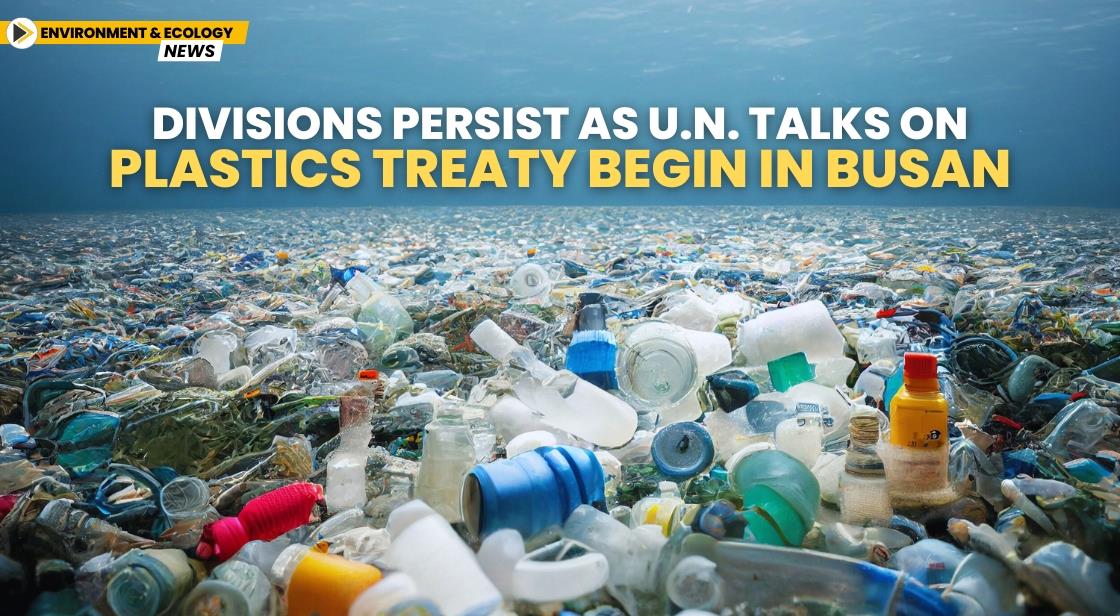Divisions Persist as U.N. Talks on Plastics Treaty Begin in Busan

News Synopsis
As the fifth round of U.N. Intergovernmental Negotiating Committee (INC-5) talks began on Monday in Busan, South Korea, the global community faces significant divisions that threaten to delay progress toward a final agreement. The talks, aimed at negotiating an international treaty to address the mounting plastic pollution crisis, have yet to resolve key issues, despite growing urgency.
The previous round of talks held in Ottawa this past April ended without clear consensus on measures to cap plastic production, a core point of contention that continues to hinder progress.
This week’s meeting is expected to focus on various alternatives to plastic production limits, including concerns about chemicals and other regulatory measures. Key players like Saudi Arabia and China, both major petrochemical producers, have strongly opposed efforts to target plastic production, leading to a complex and fragmented negotiating environment.
These divisions echo the challenges that have long stalled global efforts to tackle other pressing environmental issues, such as climate change.
At the recent COP29 summit, a climate agreement was reached that many critics, especially from poorer nations, deemed insufficient. Similarly, the path forward in Busan is fraught with disagreements.
Critical Warnings About the Plastic Crisis
Urgency in Addressing Plastic Pollution
Luis Vayas Valdivieso, Chair of the INC, expressed the dire need for a global treaty, warning at the opening session in Busan that, “Without significant intervention, the amount of plastic entering the environment annually by 2040 is expected to nearly double compared to 2022.” This stark warning highlights the grave environmental threat posed by plastic pollution, which has even found its way into human organs through microplastics.
The U.N. talks are being closely watched, with experts emphasizing the importance of securing an agreement. The treaty is seen as a vital tool to protect ecosystems and public health worldwide.
United States Shifts Position on Plastic Production Caps
A Surprising Move Amid Changing Leadership
In a surprising shift, the United States signaled its support for capping plastic production as part of the treaty, aligning itself with the European Union, Kenya, Peru, and other countries advocating for stronger measures. This move marks a significant policy change, especially given that the U.S. had previously been resistant to multilateral agreements on environmental issues, particularly under the leadership of former President Donald Trump.
However, with changing political dynamics in the U.S., questions remain about whether the current stance will hold. The U.S. delegation at the talks did not provide a definitive answer when questioned about the potential reversal of their position. Nevertheless, a White House spokesperson emphasized that the U.S. supports addressing plastic products and chemicals used in plastics, in line with its broader environmental agenda.
Health and Environmental Impact on Small Island Nations
Fiji's Struggle Against Plastic Pollution
For nations like Fiji, the global plastics treaty is seen as critical in protecting fragile ecosystems and safeguarding public health. Fiji’s climate minister, Sivendra Michael, pointed out that although the Pacific island nation does not produce plastic, it faces the devastating consequences of plastic pollution, which impacts its oceans and landfills.
Michael shared that plastic waste from other countries ultimately ends up in the Pacific, causing significant harm to marine life. He cited studies showing that most of the fish consumed in Fiji contains microplastics, posing serious health risks to both the environment and the local population.
The Petrochemical Industry’s Opposition to Production Caps
Industry Advocates for Recycling, Not Production Limits
While the petrochemical industry has expressed support for a global treaty to reduce plastic pollution, it has vocally opposed the idea of mandatory caps on plastic production. Instead, industry leaders are advocating for an emphasis on improving plastic recycling systems as a more viable solution to the global plastic crisis.
Martin Jung, president of BASF, a major chemical producer, stated that the industry would view a treaty as successful if the focus is placed solely on curbing plastic pollution rather than on limiting production. He emphasized that tackling waste through recycling programs would be more effective and sustainable in the long term.
Funding and Support for Developing Nations
Global Efforts to Support Plastic Pollution Mitigation
In addition to addressing production and waste, the treaty negotiations also involve discussions on financial mechanisms to help developing countries implement the necessary measures. At COP29, France, Kenya, and Barbados proposed a global levy on certain sectors, such as polymer production, to generate funds for climate and environmental initiatives.
This proposal, which includes a fee of $60-$70 per ton on primary polymer production, could potentially raise billions of dollars annually to assist developing nations in transitioning to cleaner energy and mitigating the impacts of plastic pollution. However, this idea has faced strong opposition from industry groups, who argue that such levies would increase consumer prices and negatively impact businesses.
Conclusion: A Long Road Ahead for the Global Plastics Treaty
The ongoing negotiations in Busan are a critical moment in the global fight against plastic pollution. With persistent divisions over production caps, funding mechanisms, and the role of the petrochemical industry, the path to a final treaty remains uncertain. Yet, as delegates continue to deliberate, the urgency to reach an agreement grows, driven by the need to safeguard both human health and the environment.
As the treaty talks progress, it is clear that finding common ground among nations with divergent interests will be essential for creating a comprehensive and effective global response to the plastic pollution crisis.
You May Like









